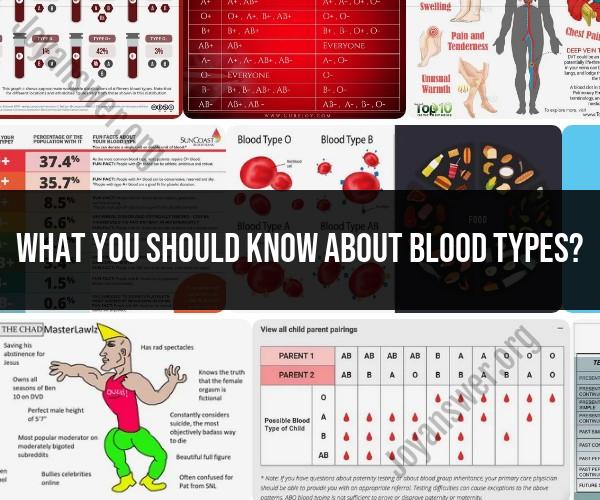What you should know about blood types?
Understanding blood types is crucial for medical professionals, as well as for individuals in certain situations, such as blood donation or organ transplantation. Here's what you should know about blood types, particularly in the context of the ABO and Rh blood group systems:
The ABO Blood Group System:
- The ABO system is one of the most well-known blood group systems, and it classifies blood into four main types: A, B, AB, and O.
- Blood type A has A antigens on the surface of red blood cells and B antibodies in the plasma.
- Blood type B has B antigens on the surface of red blood cells and A antibodies in the plasma.
- Blood type AB has both A and B antigens on the surface of red blood cells and no A or B antibodies in the plasma. AB is considered the universal recipient, as it can receive blood from any ABO type.
- Blood type O has no A or B antigens on the surface of red blood cells and has both A and B antibodies in the plasma. O is considered the universal donor, as it can donate blood to any ABO type.
The Rh Blood Group System:
- The Rh system categorizes blood into two groups: Rh-positive (Rh+) and Rh-negative (Rh-). This classification is based on the presence or absence of the Rh antigen (also called the D antigen) on the surface of red blood cells.
- If a person's red blood cells have the Rh antigen, they are Rh-positive (e.g., A+, B+, AB+). If the antigen is absent, they are Rh-negative (e.g., A-, B-, AB-).
Compatibility and Blood Transfusions:
- Blood compatibility is crucial for blood transfusions. Mismatched blood transfusions can lead to serious complications and reactions. In general, individuals can receive blood from donors with the same ABO type and, if Rh-negative, from Rh-positive donors.
Pregnancy and Rh Incompatibility:
- Rh incompatibility can be a concern during pregnancy. If an Rh-negative mother is carrying an Rh-positive baby, and there is mixing of their blood (e.g., during delivery), the mother's immune system may develop antibodies against the Rh antigen. This can lead to hemolytic disease of the newborn in subsequent pregnancies.
Blood Donation:
- Blood donation centers and hospitals routinely screen donors for their ABO and Rh blood types to ensure compatibility with recipients. Knowing your blood type can make it easier to donate blood and help others in need.
Genetics of Blood Types:
- Blood type is inherited from one's parents through a combination of genetic alleles. The ABO gene has three main alleles: A, B, and O. The presence of these alleles determines your ABO blood type. The Rh factor is inherited as either Rh-positive (D allele present) or Rh-negative (D allele absent).
Population Distribution:
- Blood type distribution varies among populations. For example, type O is more common in some ethnic groups, while type B is more prevalent in others.
It's important to note that there are many other blood group systems and antigens beyond ABO and Rh. These systems become relevant in specific medical contexts, such as blood transfusion compatibility testing and organ transplantation. Healthcare professionals and blood banks use advanced testing to ensure safe and compatible blood transfusions. If you need to know your blood type or have questions about its implications for your health, consult with a healthcare provider or get tested at a medical facility.
ABO Blood Group System and Rh Factor Types
The ABO blood group system is the most important blood group system in humans. It is based on the presence or absence of two carbohydrate antigens, A and B, on the surface of red blood cells. There are four main blood types in the ABO system: A, B, AB, and O.
The Rh factor is another important blood group system. It is based on the presence or absence of a protein called the Rh factor on the surface of red blood cells. People who have the Rh factor are Rh positive, and people who do not have the Rh factor are Rh negative.
Unique Properties of Different Blood Types
Each blood type has its own unique properties. For example:
- Type A blood: Type A blood contains the A antigen on the surface of red blood cells and antibodies to the B antigen in the plasma.
- Type B blood: Type B blood contains the B antigen on the surface of red blood cells and antibodies to the A antigen in the plasma.
- Type AB blood: Type AB blood contains both the A and B antigens on the surface of red blood cells and no antibodies to either antigen in the plasma.
- Type O blood: Type O blood does not contain either the A or B antigen on the surface of red blood cells, but it does have antibodies to both antigens in the plasma.
Importance of Blood Types in Medicine and Transfusion
Blood types are important in medicine and transfusion for a number of reasons. For example:
- Blood transfusion: Blood transfusions are used to treat people who have lost blood due to injury, surgery, or illness. When a person receives a blood transfusion, it is important to match the blood type of the donor and the recipient. If the blood types are not compatible, the recipient's body may attack the donor's red blood cells, which can lead to a serious reaction called hemolytic transfusion reaction.
- Organ transplantation: Blood types are also important in organ transplantation. When a person receives an organ transplant, it is important to match the blood type of the donor and the recipient. If the blood types are not compatible, the recipient's body may attack the donor organ, which can lead to organ rejection.
- Prenatal care: Blood types are also important in prenatal care. For example, if a pregnant woman is Rh negative and her fetus is Rh positive, the mother's body may produce antibodies to the Rh factor. These antibodies can cross the placenta and attack the fetus's red blood cells, which can lead to a condition called hemolytic disease of the newborn (HDN).
Blood types are a complex and important part of human biology. They play a vital role in medicine and transfusion, and they can help to ensure the health and well-being of people around the world.













